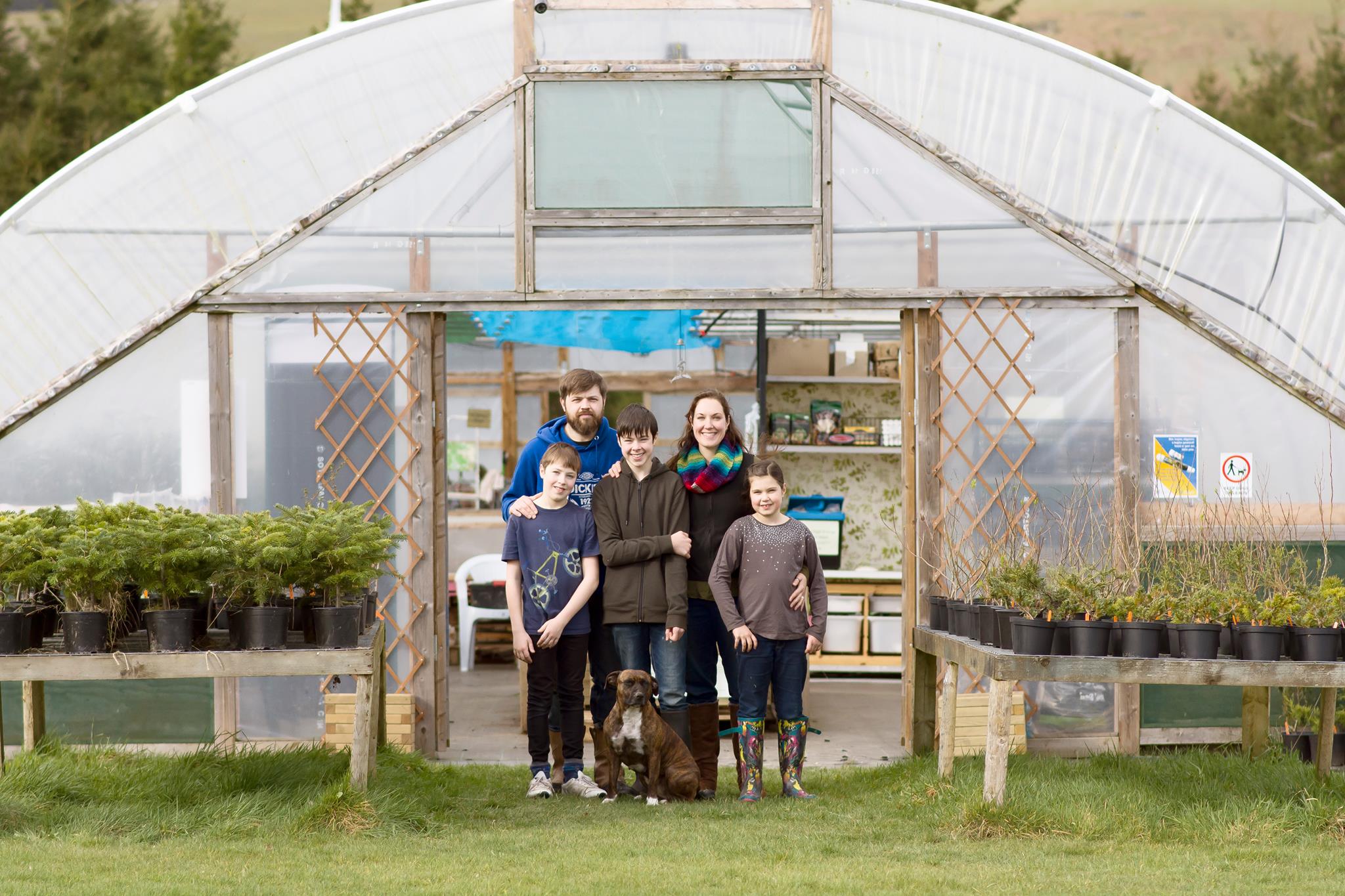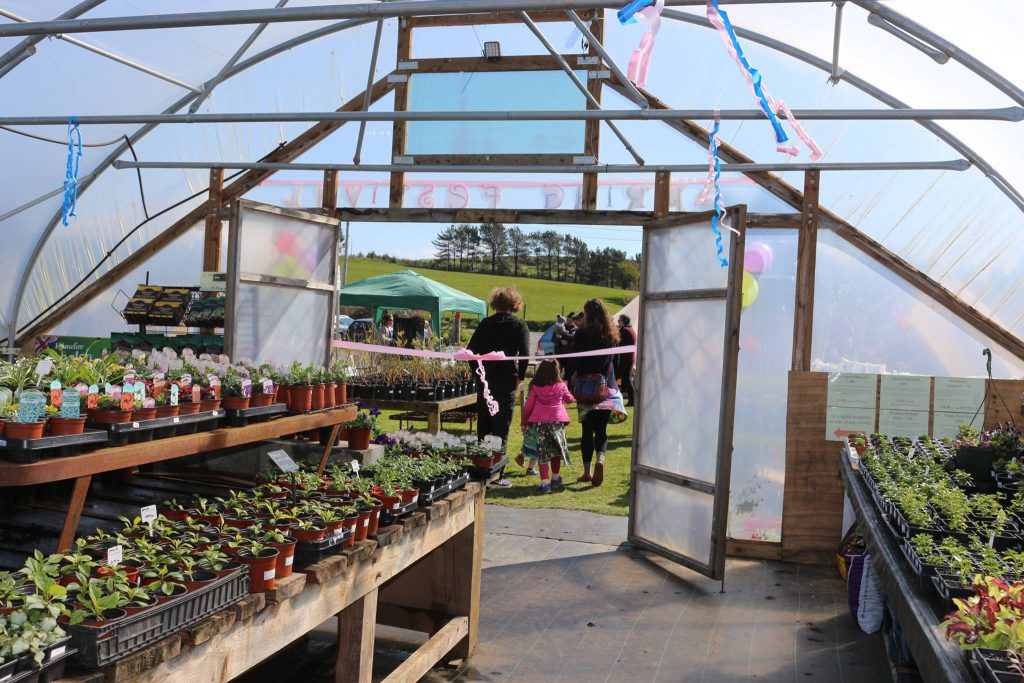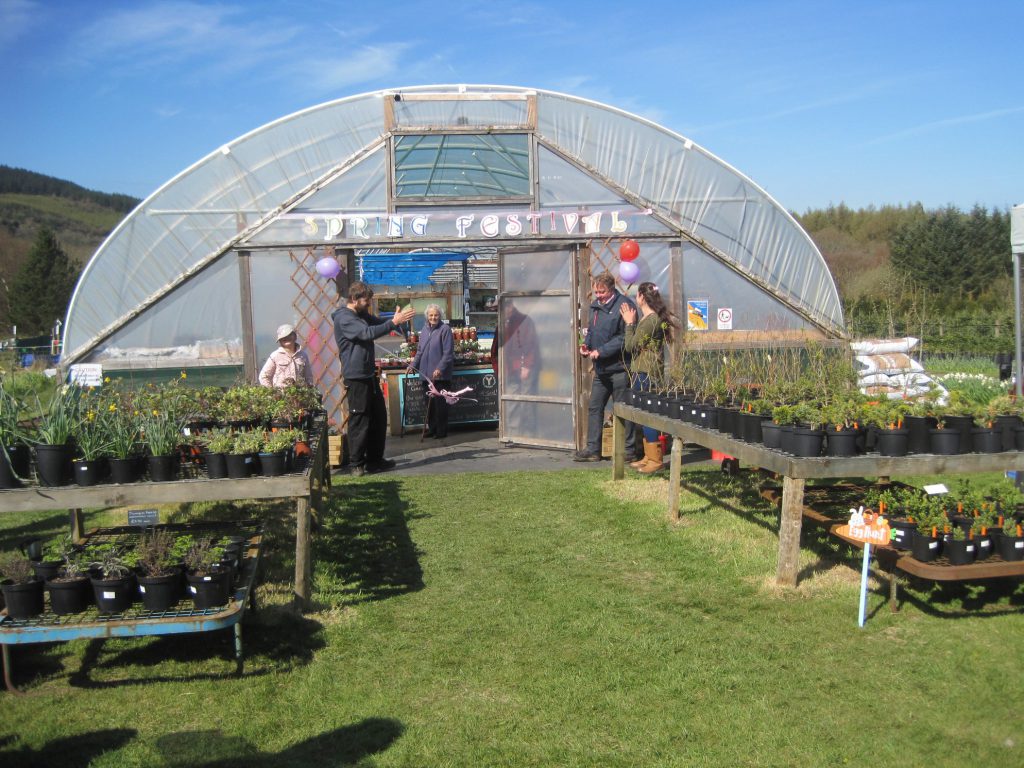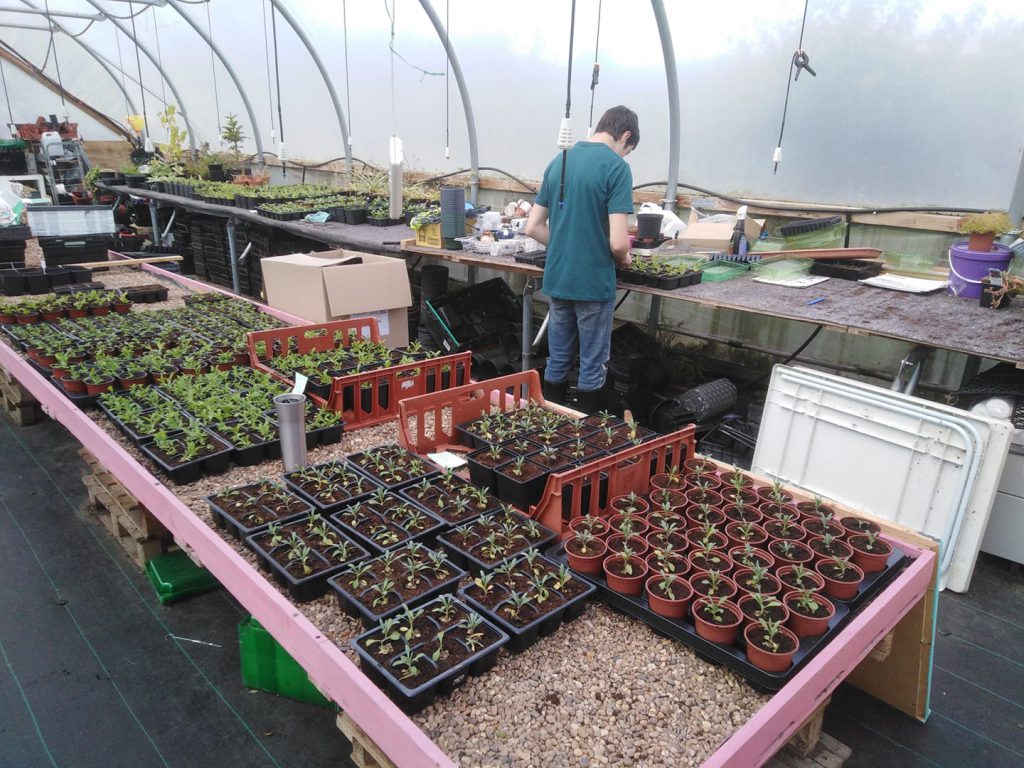
We find Tam, Paul and their family from Ystwyth Garden Nursery inspiring. With very little horticultural experience – ‘we didn’t know the difference between a begonia and petunia’, they moved their family and lives from Kent to Wales to start their family-run, off-grid and eco-friendly adventure. Having seen what they’ve achieved over the past year we can’t wait to see what they get up to in the future.
We recently got in touch with Tam to talk about how they got started, their work with us and their plans for the future. Thank you Tam!
Tell us about your business. When did you start and what got you into it?
‘Well the nursery was already established when we came across it for sale right about the time we decided to start looking for a new life in Wales. We’re from Kent and Paul worked in the Docklands for over a decade, and we’d already moved to the furthest part of our area we could to get a decent sized house for the money, but it was still not a cost-effective lifestyle and we were in a lot of debt with no idea how to end the cycle of accruing more.
We’ve always wanted to move to Wales. It took a long hard look at our prospects of staying where we were (with friends and family nearby, the security of a steady paycheck even if it wasn’t enough, and the comfort of being somewhere familiar) to realise that things were only going to get harder financially as time went on, not better. Utility bills were by far our biggest problem, but the expanding Clean Air zone around London was the clincher – it meant we’d be spending even more just for Paul to get to work. It was simply unfeasible. Moving to Wales became the simplest (if not the easiest) solution to everything.
When Paul sent me (Tam) the listing for the nursery I almost dismissed it outright – we were barely capable in the garden! Let alone the fact that we’d have to live in a caravan on the land (which was tricky in terms of legality and planning permission but we managed to get that sorted), we’d have install completely off-grid systems for everything, and that we’d have to take over a business which neither of us had experience doing. But we’ve always believed that there is nothing a person can’t learn if they want to and are willing to do the work, a philosophy that enabled us to take our children out of school and home-educate them. With the power of the internet and a solid mindset, we knew we could figure it out. But we’ve also had a lot of help along the way – from Business Wales, Horticulture Wales, and many others who are now dear friends. We couldn’t have done it without all that support.’
Tell us about your first season at Ystwth Garden Nursery

‘Our first bedding and basket season, which was kicked off by our successful first Annual Spring Festival in April of 2019, was a huge learning curve. For people who didn’t know the difference between a begonia and petunia before, we quickly became knowledgeable about many varieties of plants and grew a fair number of species from seed. It was a joy to discover that not only were we capable of growing plants in quantity, but we really enjoyed it, and that our love for our little green babies seemed to translate into healthy, organically grown plants that our customers commented on with enthusiasm, comparing the quality as better than some big-name competitors. We truly feel that plants know when they are loved and cared for, and respond accordingly. We’ve seen the difference in them in times when we’ve been exhausted and let our attention of them slip.

We experimented a lot over the first year with different avenues to increase our income, including selling coal and fuel, gardening tools and accessories, seeds and bulbs, boot fairs and craft markets. But by the end of the year we realised that what people come here for are plants. And compost. Plain and simple. So our plans for 2020 are much simpler than our plans for 2019 were – grow our range of perennials, increase the variety of bedding and basket plants for the summer, and grow a core range of peat-free organic flowers specifically for pollinators in our new role as members of the Saving Pollinators Assurance Scheme by the Growing the Future Project at the National Botanic Garden of Wales.
We have been very eco-conscious people for a long time and while we never imagined ourselves as nursery growers, we are so happy to be in a position now to do our bit from such a powerful place. Not only do we have the opportunity to help our community embrace organic and peat-free growing and encourage them to choose plants that will make their gardens both beautiful AND beneficial for our pollinating pals, but we also get many folks enquiring about our off-grid systems and have had the pleasure of discussing at length with interested parties how they can go about adding these elements into their lives and businesses. We feel, to some extent, that we are part of the change that needs to happen in the world if we want our future generations to have a beautiful and stable world to live in. It’s a driving force behind all our plans and goals in our business and lives.’
Who is involved in your business?

‘Just Paul and I, with a little help from the kids as part of their home education interests. Our oldest, Ethan, is very hands-on with physical work and anything engineering-based. Our second son, Leon, is just as happy to help sort returned pots as he is to sow seeds. And our youngest, Leela, has her mother’s entrepreneurial streak, growing plants of her own to sell as well as food plants for us as a family with Paul’s help.’
What do you currently grow and sell?
‘Presently, we have a bit of everything on site – some perennials, a few tree saplings, some veg plants and some alpine plants. We also stock giftable plants such as early spring flowering plants and alpines in antique terracotta pots and upcycled pottery, perfect for any occasion as eco-friendly and long lasting gifts. We also have some spring bulbs getting ready to be made into beautiful Mother’s Day baskets for when we re-open after our winter break on the 6th of March.
We don’t currently specialise in any particular plant variety, though it’s something we’re always thinking about. As I mentioned, we are planning to increase our range of perennials that are specifically suited to our high-altitude, acidic soil-based region, introduce our Saving Pollinators Assurance Scheme range of organic flowering plants, and of course a good range of summer bedding & basket and also vegetable plants for our allotment-lovers.’
What are your future plans for the business and where do you want your business to be in 5 years?
‘Our long-term plans for the business include more than our plants. Along with additional poly tunnels and a glass house for growing, we also want to take advantage of our breathtakingly beautiful location and increase the events-element of the business. Our craft markets, started in July 2019, were quite successful and showed a lot of promise and support from our community. While we won’t be holding monthly markets anymore, we are definitely going to continue with seasonal fairs.
Axe-throwing and archery over the summer months are our next additions, along with an external tea room. An alcohol licence and pergola will enable us to have an outdoor bar for the long summer evenings and we really like the idea of providing Open Mic Nights. Our income sharply drops off from plant sales from mid-July and this would provide additional income through the second half of the year.
By 2025 we hope to have reached the point that we have a glamping pod installed at the rear of the land in the wooded area, and to be hosting eco-weddings that we aim to furnish fully from natural materials – from site grown blooms and plantable favours to wild-flower seed confetti.’
What have we done with Ystwyth Garden Nursery?
Issie, our Project Development Officer, first met with ### in ######. She introduced them to a new wholesale supplier who’ve had a big impact on their business, shared details of other off-grid members to liaise with and also introduced them to Ceredigion Growers, Tyfu, other training and funding. We’ve also shared their content on our social media channels to promote their business. They’re also members of our Short Supply Chain Cluster.
What difference has being a member of Horticulture Wales made to your business?
‘Hort Wales represents to us a great wealth of opportunities we didn’t know were available. If it weren’t for Issie giving us King’s Nurseries information we would have really struggled with our first bedding and basket season and it made the difference between a successful Spring Festival and not.
The CAT talk gave us the opportunity to meet other like-minded growers, relay our experiences and get the word out about our little nursery. That Hort Wales has helped with spreading the word via social media has no doubt added credibility to our business and helped to increase our reach to new customers. Sometimes you just don’t know what you don’t know, and that’s what makes Hort Wales such a valuable resource for folks like us.’
What do you see as the big opportunities for Welsh Horticulture? And what difference can Horticulture Wales make?
‘As we are pretty new to horticulture in general we really don’t feel able to comment on this too much.
However, in terms of the opportunities we see from our limited perspective, we do feel that there is much scope to improve Welsh land – especially areas largely consumed by sheep and cattle farming. Ruminants should be eating a range of vegetation, not just grass, and encouraging farmers to add suitable herbs and flowers, as well as trees and brush plants to their grass fields, would significantly impact the health of their animals, provide more food for pollinators and increase diversity of wildlife to positively impact native ecosystems.
We have a similar view on grain crops. It’s not very well accepted (or even known) but while grains are “easy” to grow and subsidised by most governments, it’s not a very healthy food source, either for grazing animals or humans. There is a growing movement in the world of people choosing to avoid grains (often called Paleo or Primal eating) and substituting fruit and vegetable foods, and flours made from nuts, coconut, tapioca etc. My own personal healing of autoimmune symptoms was greatly impacted by removing grains from my diet, and studies have proven that even for people with a healthy digestive system who experience no symptoms from eating wheat, show adverse gut reactions to the toxins in wheat for a significant time after consumption. It’s been directly linked to a huge range of diseases, not least of which are autoimmune diseases, a very under-diagnosed range of conditions from eczema to MS, affecting millions of people whether they are aware of it or not. I can certainly recommend a large range of books and websites on this subject.
Added to that the growing use of GMO crops, the negative effects of monoculture on the soil, and the number of toxic chemicals used which are devastating to the pollinators and other wildlife as well as the water sources from run-off, and it’s clear that grain crops are not the best way to feed the people. Encouraging farmers to replenish their fields naturally with green manures, practise crop rotation and grow food plants that naturally do well in their location would go a very long way to reducing our soil erosion problems, pollinator die-off as well as feed the people real food. Birds are meant to eat grass seeds; they have the requisite digestive enzymes to deal with the toxins; humans, and even cows, are not. We simply don’t have the necessary biological means to process them.
If there was a way Hort Wales could help it would probably be to research (where needed, I’m probably preaching to the choir!) and then educate farmers on better practices and ways they can continue to serve their communities while also serving their land and future-proofing their livelihoods at the same time.’
